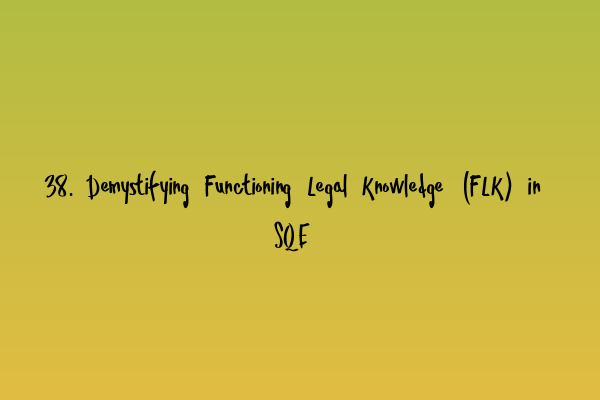Demystifying Functioning Legal Knowledge (FLK) in SQE
Welcome to SQE Exam Law, your go-to resource for all things related to the Solicitors Qualifying Examination (SQE). In this article, we will demystify the concept of Functioning Legal Knowledge (FLK) in the SQE and provide you with a comprehensive understanding of what it entails.
Before we delve into FLK, it’s essential to have a clear understanding of the SQE itself. The SQE is a new two-part assessment that will replace the traditional route to becoming a solicitor in England and Wales. It assesses the necessary skills, knowledge, and behaviours required to practice as a solicitor.
FLK is one of the two components of the SQE Part 1. It focuses on testing a candidate’s ability to apply legal knowledge to practical scenarios and requires a deeper understanding of the law rather than mere rote memorization.
FLK is a departure from the traditional way of assessing legal knowledge, which typically relied on memorizing large volumes of case law and legislation. Instead, it emphasizes the application of legal principles to real-world situations. This shift in approach reflects the changing demands of legal practice and the need for solicitors to be able to apply their knowledge in a practical context.
Understanding the FLK Assessment
The FLK assessment is divided into two components: multiple choice questions (MCQs) and extended scenarios. The MCQs test your knowledge of law and legal procedures, while the extended scenarios require you to apply your legal knowledge to realistic situations.
The aim of the FLK assessment is to evaluate your ability to identify and apply the relevant legal principles to solve legal problems. This includes understanding the legal issues involved, identifying appropriate legal sources, and providing reasoned advice or solutions.
To excel in the FLK assessment, you need to develop a deep understanding of the law and its application in practical scenarios. This requires a combination of knowledge acquisition, critical thinking, and analytical skills. It’s essential to grasp the fundamental principles of each area of law and be able to apply them effectively.
Preparing for the FLK Assessment
Preparing for the FLK assessment requires a strategic approach that combines comprehensive learning with practical application. Here are some tips to help you prepare:
- 1. Unlocking Knowledge with SQE Webinars: Expert Insights at Your Fingertips: Take advantage of SQE webinars that offer expert insights and guidance on various legal topics. These webinars provide valuable information and can help you gain a deeper understanding of FLK.
- 2. Review of SQE Course Providers: Choosing the Best Fit: Select an SQE course provider that suits your learning style and needs. Look for providers that offer comprehensive materials, interactive learning tools, and mock assessments to help you practice FLK.
- 3. Unveiling the SRA Syllabus for the SQE: Familiarize yourself with the SRA syllabus for the SQE. This will give you an overview of the topics that may be tested and help you structure your learning accordingly.
- 4. Conquer the SQE: Insider Tips and Study Tricks for Success: Adopt effective study techniques such as creating concise notes, using flashcards, and practicing past FLK questions. This will help consolidate your knowledge and improve your ability to apply legal principles.
- 5. Grading System in SQE: Understanding How Exams are Evaluated: Familiarize yourself with the grading system in the SQE. Understanding how exams are evaluated will help you set realistic expectations and prioritize your preparation accordingly.
By following these tips and incorporating them into your study routine, you can enhance your FLK skills and improve your chances of success in the SQE.
Conclusion
Functioning Legal Knowledge (FLK) is an integral part of the SQE Part 1 assessment. It tests your ability to apply legal principles to practical scenarios, reflecting the demands of modern legal practice. Preparing for the FLK assessment requires a comprehensive approach that combines knowledge acquisition, critical thinking, and practical application. By following the tips outlined in this article and utilizing the resources available to you, such as SQE webinars and course providers, you can develop the necessary FLK skills to excel in the SQE. Good luck with your preparations!
